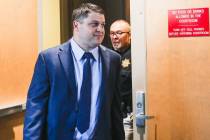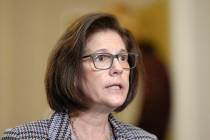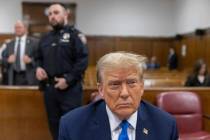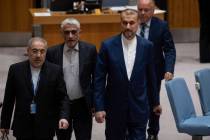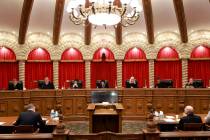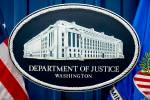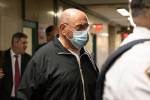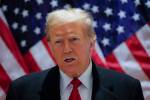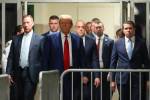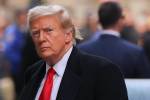Health crisis witnesses silent
After health care authorities in February announced the link between a hepatitis C outbreak and the Endoscopy Center of Southern Nevada, Deputy District Attorney Scott Mitchell had hoped criminal charges could be filed by summer's end against those responsible for putting thousands of Nevadans at risk for disease.
Now, he suspects felony grand jury indictments for criminal medical negligence or battery with substantial bodily harm won't be handed down until the spring of 2009.
One reason for the delay lies with a reluctance by witnesses to cooperate, Mitchell said.
"There's a financial incentive not to be a snitch," the 24-year veteran of the prosecutor's office said. "In a normal criminal case, it's much easier for someone to step forward and do his civic duty. Here, if they come forward and talk about what occurred, they can lose their medical license and their livelihoods.
"There also appears to be a fear of physical retribution if they talk," Mitchell said.
Mitchell said the Clark County District Attorney's office has gotten its share of phone calls about the investigation's progress.
"I understand that the public wants justice," Mitchell said. "What I can say is that the investigation is moving forward. We do have people cooperating, but it is slow going, where people will only meet in the middle of the night with investigators, whispering into microphones."
Federal and state officials won't offer a timetable on the progress of their investigations.
Las Vegas police Capt. Al Salinas, who is working closely with Mitchell, said a financial analyst and two investigators he has working on the case have to be pulled off intermittently because of other pressing police business.
Salinas also stresses that his investigators are finding themselves in new territory.
"We've never had a case of this magnitude and with these challenges," he said. "What it's going to come down to for some of these people is whether they're more worried about their licenses or their freedom."
The health of the endoscopy center's owner, Dr. Dipak Desai, also could slow down criminal proceedings, Mitchell said.
"I know they (his legal team) have said he had a stroke, but they're going to have to prove to me he can't participate in his defense or a trial," Mitchell said recently as he sat outside a Clark County courtroom.
Mitchell said it is highly unlikely that Desai's health -- the physician's legal team said he suffered a stroke in July -- would keep him from going to trial.
"He'd practically have to be institutionalized for that to happen," he said.
Tony Clark, who recently stepped down as executive director of the Nevada State Board of Medical Examiners, said attorneys for Desai recently told the board's doctor that Desai had difficulty recognizing some items, including a wristwatch.
While Mitchell and Las Vegas police characterize their investigation as moving forward far more slowly than expected, representatives of the FBI and the Nevada attorney general's office are tight-lipped, saying they can't confirm or deny investigations.
There is no doubt, however, that they are under way.
A task force comprised of federal, state and local investigators meets on a regular basis in Las Vegas to share information about the case, according to Clark.
Health officials to date have advised 60,000 patients of Desai's clinics to undergo testing for hepatitis and HIV. Authorities investigating a cluster of hepatitis C cases had observed clinic nurses reusing syringes in a manner that contaminated vials of anesthetic and, they believe, infected patients.
Two Las Vegas attorneys representing former patients of Desai's clinics in civil actions say the FBI has contacted them about the clinic's billing practices, which they say show that Desai and his staff overbilled for anesthesia.
"They were very interested in how the billing was done," said one attorney, who said the FBI agents told him not to divulge their visit. "I think they went away understanding how insurance companies got bilked."
Desai's criminal attorney, Richard Wright, declined to comment for this story.
Dr. Charles Cohan, a former Las Vegas physician who says he shared what he knew about Desai's practices with local, state and federal authorities in the 1990s, said he recently met with FBI agents in Pennsylvania, where he now lives. Cohan also has spoken with Mitchell and investigators from the Las Vegas police and the attorney general's office.
Cohan's 1996 complaint with the Nevada State Board of Medical Examiners resulted in the only formal state action ever to be taken against Desai until the recent suspension of his license. Desai was fined $2,500 for advertising that all members of his practice were board certified in gastroenterology when they were not.
Cohan's self-described "pursuit for justice" involving Desai abruptly ended in 1999 when he said he received a phone call from a man who said Cohan's wife or child would be hurt if he didn't shut his mouth. The Cohans moved to Pennsylvania that year.
Mitchell said he senses something that goes beyond mere reluctance when interviewing potential witnesses.
"There is a tremendous pressure to keep silent about things they know," he said. "I know concern over licenses is involved, but there is a discernible fear that I detect that goes beyond that. I can't prove that these people are physically threatened, but if Cohan is telling the truth -- and I have no reason to doubt him -- then I think there is something there in this area. You can sense it when you talk with them."
Cohan said he has shared 450 pages of documents with investigators that show Desai billed for comprehensive examinations when patients were seen for only five minutes. Cohan said he hopes that this time authorities will listen more carefully to him.
Mitchell said he plans on calling Cohan as a witness during criminal proceedings.
"I wish other doctors in our community would come forward the way he did, and has," Mitchell said.
Clark said the investigative task force has proved to be invaluable as the board tries to get a handle on everything from a physician's finances to his standard of care in the operating room.
"It really helps give direction," Clark said.
Though the medical board has temporarily suspended the licenses of Desai and a colleague, Dr. Eladio Carrera, Clark said hearings that could take their licenses away permanently have been continued indefinitely.
Clark said the board may seek to do its own examination of Desai's condition instead of merely relying on medical reports produced by Desai's legal team. Those reports were done by doctors at UCLA.
But Clark said the board might do its own exam shortly.
Carrera's lawyers asked the board for a continuance of his October hearing because too many potential witnesses planned on exercising their Fifth Amendment rights against self-incrimination, Clark said.
"They've asked us to tighten up our charges against him, that they're too general, and I believe we can do that so witnesses can testify," Clark said. "It doesn't do anybody any good if witnesses aren't testifying."
Both Clark and Debra Scott, executive director of the state nursing board, said their licensing agencies cannot give immunity to a medical professional who testifies at a criminal trial and admits to behavior that violates their own regulations.
These medical professionals could get immunity from the prosecution, but the board would still act on their licenses, Clark said. Six nurses already have voluntarily surrendered their licenses.
Mitchell believes that he and his co-prosecutor, Michael Staudaher, a former physician's assistant, share a passion for the case, in which authorities have directly linked nine cases of hepatitis to Desai's clinics.
"You can't prosecute this case without a real desire to protect the public," Mitchell said. "You can't prosecute this case without being bold. We're taking on people with immense power. Not elected power but money power. When you're worth $150 million to $200 million, you have the power of a governor or a senator, and you can control a lot of people. To go up against that influence and the lawyers they will hire, you have to fight a lot of people. It's not a job for shrinking violets."
Mitchell said potential defendants in the case knew who the witnesses would be before authorities did.
"They worked with them," Mitchell said. "We suspect that when we speak to them (potential witnesses), they've already spoken to others who have a real interest in this case. We believe we're having to deal with agreements and allegiances that may have already been made."
Authorities can't promise a guilty verdict to witnesses who may be worried they'll be blackballed by the medical profession if they testify, Mitchell said.
"What we can urge them to do is the right thing," he said.
Contact reporter Paul Harasim at pharasim@reviewjournal.com or 702-387-2908.








